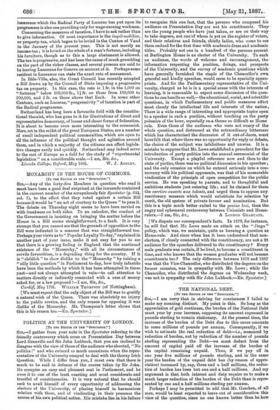POLITICS AT THE UNIVERSITY OF LONDON. [To re. Emrez or
THE Bezerncat."] SIR,—I gather from your note in the Spectator referring to the friendly controversy which arose on Presentation Day between Lord Granville and Sir John Lubbock, that you are inclined to disagree with the view of those of the audience who shouted, " No politics !" and who evinced so much uneasiness when the repre- sentative of the University essayed to deal with the thorny Irish Question. While I differ from you, I must own that there is much to be said in defence of the course taken by Sir John. He occupies an easy and pleasant seat in Parliament, and he owes it to one of the least exacting and most considerate and trustful of constituencies. It is very natural that he should seek to avail himself of every opportunity of addressing the electors of the University, of placing himself in harmonious relation with them, and of vindicating in their presence the course of his,own political action. His mistake Resin his failure to recognise this one fact, that the persons who composed his audience on Presentation. Day are not his constituents. They are the young people who have jest taken, or are on their way • to take degrees, not one of whom is yet on the register of voters, and their relatives and friends, chiefly ladies, who come to see them endued for the first time with academic dress and academic titles. Probably not one in a hundred of the persons present at Burlington House is an elector of the University. To such an audience, the words of welcome and encouragement, the= information respecting the position, doings, and prospects of the University, and the survey of academic questions which have generally furnished the staple of the Chancellor's own graceful and kindly speeches, would seem to le specially appro- priate. And for the Parliamentary representative of the Uni- versity, charged as he is in a special sense with the interests of learning, it is reasonable to expect some discrission of the ques- tions he can handle so well,—the educational, social, and scientific- questions, in which Parliamentary and public measures affect most closely the intellectual life and interests of the nation. There is a wide range of interesting and appropriate topics open to a speaker in such a position, without touching on the party polemics of the hour, especially on a theme so difficult as Home rule. Even those of the audience who were not weary of the whole question, and distressed at the extraordinary bitterness which has characterised the discussion of it out-of-doors, must have felt that where there was no opportunity for reply or debate, the choice of the subject was infelicitous and unwise. It is a mistake to suppose that Mr. Lowe established a precedent for the introduction of party politics into the annual ceremonial of the University. Except a playful reference now and then to the state of parties, there was no political discussion in his speeches;, and the only occasion on which he entered seriously into a con- troversy with his political opponents, was that of his memorable vindication of the principle of open competition for the public service. He was speaking to parents, and to thoughtful and ambitions students just entering life ; and be claimed for thew the carriere ouverte aux talents; and urged them to oppose any reactionary measure which would substitute for selection by merit, the old system of private favour and nomination. But this is a topic much better- suited to the genius foci, than the angry and ephemeral controversy between Unionists and Home.
[We dispute our correspondent's facts. In 1878, for instance, he will find that Mr. Lowe made an attack on the " Jingo " policy, which was, we maintain, quite as burning a question as Home-rule. And since when has it been understood that non- electors, if closely connected with the constituency, are not a fit audience for the speeches delivered to the constituency P Every male graduate was certain, if he lived, to become a constituent in time, and who knows that the women graduates will not become constituents too ? The only difference between 1878 and 1887 was that the Vice-Chancellor, who distributed the degrees on the former occasion, was in sympathy with Mr. Lowe ; while the Chancellor, who distributed the degrees on Wednesday week,. was not in sympathy with Sir John Lubbock—En. Spectator.]


















































 Previous page
Previous page